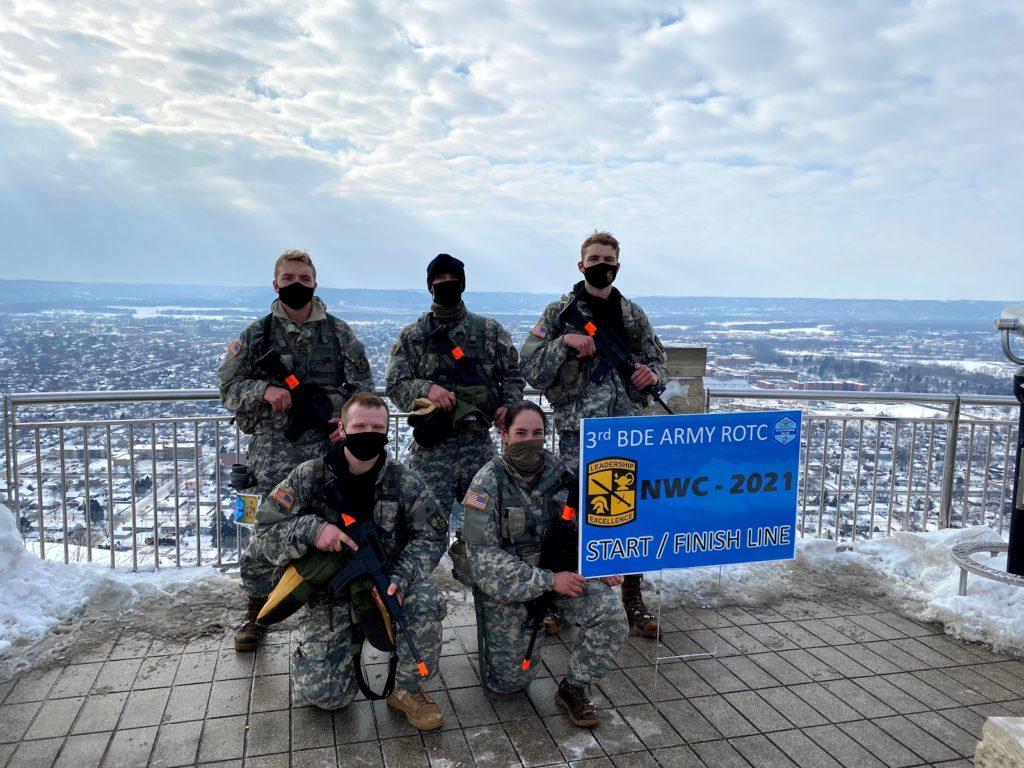A team of five NMU ROTC cadets placed 9th out of 29 ROTC teams from the region competing in the Northern Warfare Challenge this past weekend.
The Northern Warfare Challenge is a competition to test ROTC cadets’ ability to march with a rucksack and tactics in arctic warfare. Hosted in La Crosse, Wisconsin, the competition consists of a written test and a 16-mile “ruck march” broken up by different challenges: marksmanship, fire starting, tying knots and first aid, said ROTC cadet Jack Teichman, a sophomore majoring in management.
“The strategy going in was to be as quick, as thorough and as effective as possible, while at the same time not exerting too much energy beforehand,” Teichman said, who competed in last year’s competition.
The cadets carried rucksacks, weighing at least 35 pounds, along changing terrain and elevation. The first challenge was marksmanship. The challenge was to shoot a pellet rifle ten times at a target 75 meters away. The number of times the cadet hit the target and the closer they hit to center mass, determined the score the cadet got, Teichman said.
“Everybody put in tremendous effort,” Teichman said. “Everyone was working hard.”
The team moved on to the next leg of the ruck. After a couple of miles, they came to another event. The cadets had 20 minutes to build a fire with steel wool and an L-shaped flashlight and make it strong enough to burn a piece of twine positioned a foot above the fire pit. They finished the task in five minutes, Teichman said.
“It was a good show of effort,” Teichman said. “It was one of the events that we did strongly in.”
The team was also judged on its ability to assess and evacuate a hypothermic casualty. They told the judge the steps for first aid and what actions needed to be done, such as removing wet clothing, wrapping the victim to keep them warm and securing the head. The team was graded on the correct order of steps, speed and efficiency. The team had to load the victim onto a rescue sled and transport them 2-3 miles to the rescue location. The sled was loaded with 135 pounds of weights to simulate pulling a real victim, Teichman said.
“We did strongly in the first aid related event,” Teichman said.
This year the team did better with the terrain because of the weather. Even though it was cold, which meant the cadets had to dress warmer, the ground wasn’t wet or slippery. It made the ruck march easier, said returning ROTC cadet Alex Scheglowski, a sophomore majoring in entrepreneurship, who also participated last year.
The cadets trained for nearly a month in preparation for the challenge. They trained in general strength and fitness and would ruck up Sugarloaf and Hogsback, Scheglowski said.
“That was super useful,” Scheglowski said. “We got to get some practice in going up and down elevation, which is what the entire competition was.”
During training, the team had help from their cadres and some older cadets who had done the competition in previous years. Although the cadets knew the challenges, they didn’t know any specific details, Scheglowski said.
“It’s worth the training and the effort you have to put in,” Scheglowski said.
One of the team’s strengths this year was communication. During one of the legs of the ruck march, one of the cadets let the rest of the team know they were starting to struggle. The team, then, took turns carrying the cadet’s rucksack around until the cadet was feeling better. There wasn’t any judgment, Scheglowski said.
“We had a very cohesive team,” Scheglowski said. “It was just a lot of good communication between the team members letting each other know when to slow down or speed up.”
The team had to encourage each other. They had to learn to help their team and allow their team to help them, said Lt. Col. Timothy Harris, professor of military science, who went with the cadets to the competition.
“It’s a tough race. It’s cold and long,” Harris said. “We are really proud of how our cadets came together.”




























